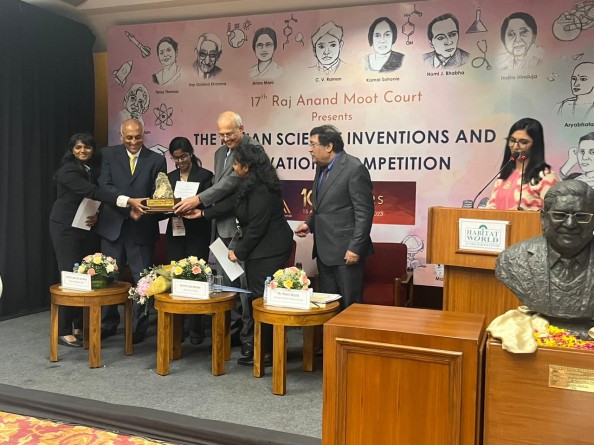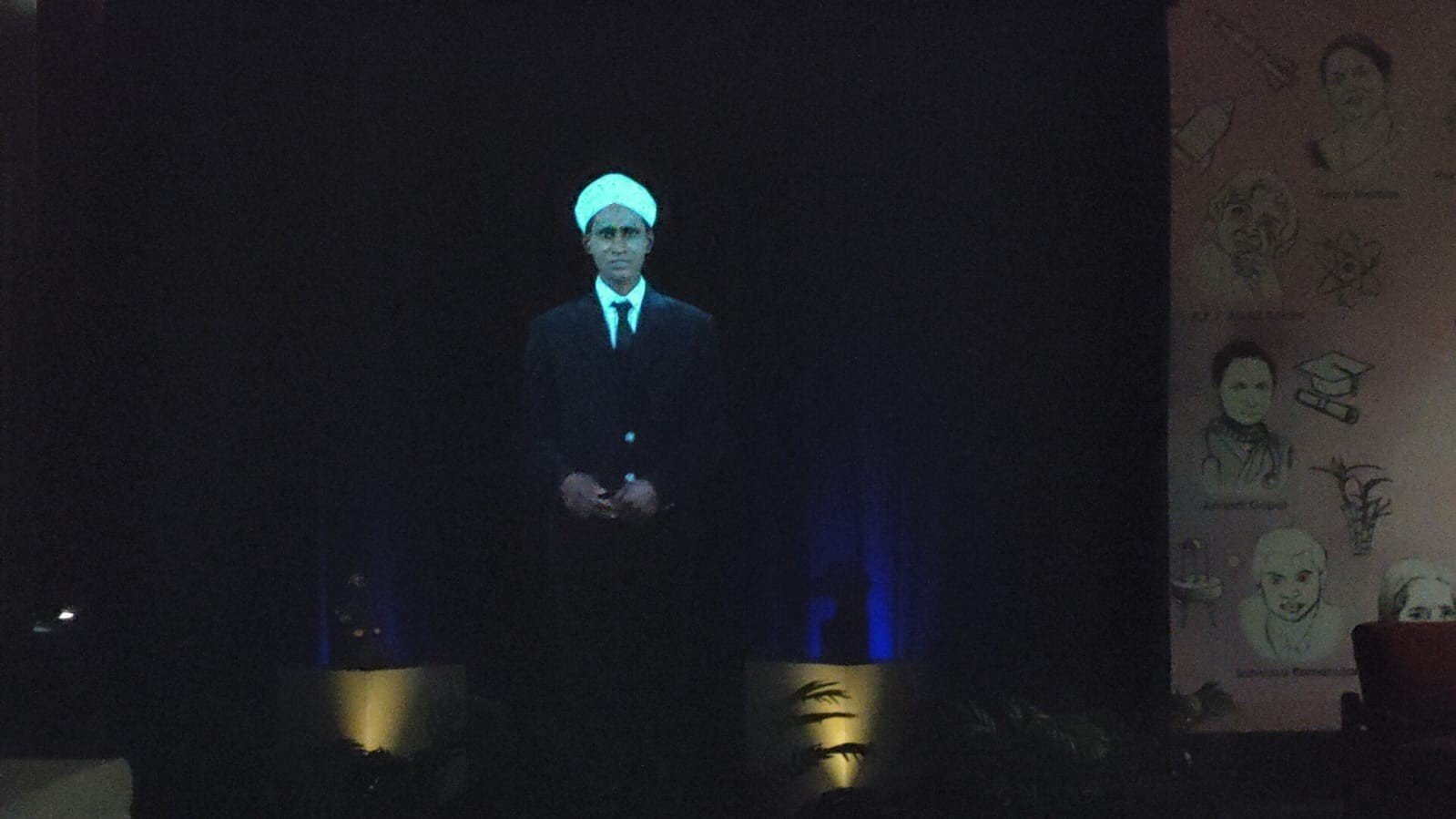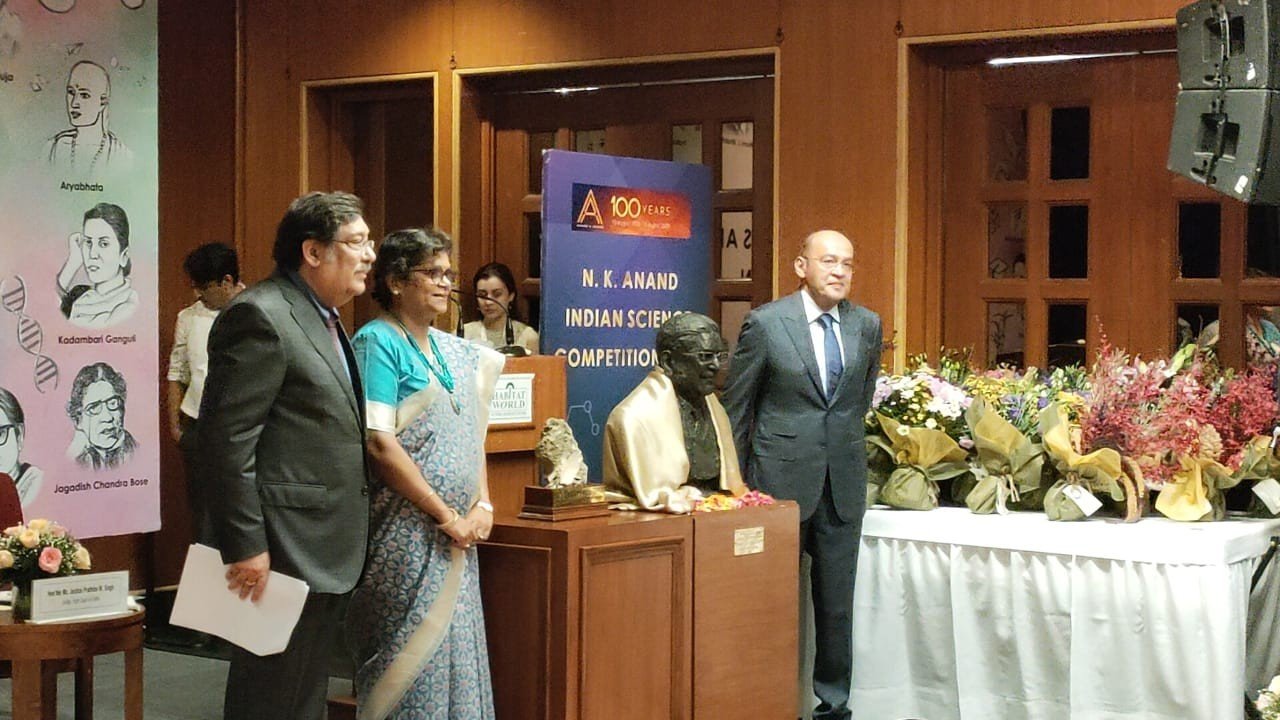Anand and Anand revives Indian inventions and Sir C.V. Raman with law student competition
29 August 2023

Anand and Anand’s Indian Science Competition trophy is awarded to The Tamil Nadu Dr. Ambedkar Law University Chennai School of Excellence in Law, which covered Kumilithumbu, an ancient irrigation system. Firm managing partner and IP lawyer Pravin Anand is second from right.
In the midst of celebrating its 100th anniversary, IP specialist law firm Anand and Anand hosted the Indian Science Competition at the India Habitat Centre on August 26, 2023, where 21 teams of law students from various law colleges across India turned storytellers and celebrated Indian science. They presented on innovations uniquely originating in India with Justice Yashwant Verma, Justice Manmohan, Justice Pratibha Singh, Justice C Hari Shankar and Justice Amit Bansal, and retired justices Manmohan Singh, Mukta Gupta and Najmi Waziri of the Delhi High Court gracing the event.
With the event happening hot on the heels of India’s landing on the Moon, the judges, including Justice Pratibha Singh, expressed the far greater need to protect and celebrate Indian inventions and innovations by spreading awareness amongst the country’s youth, including lawyers.

Bringing Sir C.V. Raman to life
The firm brought back to life Sir C.V. Raman, India’s first Nobel Laureate, as it unveiled his 3-dimensional hologram.
The hologram of Sir Raman answered questions presented by the firm’s managing partner and noted IP lawyer Pravin Anand, Justice Pratibha Singh and Justice Yashwant Varma.
Sir Raman answered questions pertaining to his interest in science, his childhood and India’s scientific prowess.
On a lighter note, when asked what he thinks about present-day traffic in Delhi, Sir Raman said, “Maybe I will answer that next time,” evoking laughter from all in the room, including the judges.
The hologram is a part of the firm’s commitment to promote the interest of Indian youth, including aspiring lawyers, in science, technology, engineering and math (STEM) and related fields. The firm hopes to come up with a virtual museum of holograms of scientists and inventors.
“When we spoke to youth, they knew Einstein, they knew Newton but we thought, what about Indian scientists? So, we thought of Sir C.V. Raman. When we met and showed the hologram to Sir Raman’s grandson, he said it had an uncanny resemblance to the young Raman. The voice, he said, was on point,” Pravin Anand said.
This unique effort from the firm also comes at a time when India is laying increasing thrust on economic development through IP.

Unique Indian inventions
The competition saw law students telling stories and making presentations about Indian inventions from various eras. These included an ancient irrigation system called Kumilithumbu, unified payments interface (UPI), a zinc extraction system and Mysore rockets made by the army of Tipu Sultan.
The winner’s trophy, made out of a fossil, was won by The Tamil Nadu Dr. Ambedkar Law University Chennai School of Excellence in Law, which covered Kumilithumbu. The National University of Study and Research in Law (NUSRL), Ranchi was runner-up for their presentation of UPI.
The winners were adjudged in the final round by Justice C. Hari Shankar and Justice Amit Bansal.
What is Kumilithumbu?
Tamil Nadu was once under the rule of Raja Raja Chozhan, the great Chola king. In this time, 200 feet from the bank of a lake, a granite platform was built on the lake bed. Two stone pillars were erected on the platform. Two horizontal stone beams were fitted to the pillars. A box of stone was built at the foot of the pillars, with a hole on top and smaller holes on the side. An iron rod, to the end of which a stone was fixed, passed through the horizontal beams. The stone served to plug the hole on top. When water had to be let out for irrigation, the stone plug was lifted. The force of the water that gushed into the hole drew sediments through the holes in the side of the box, and the slurry got carried along with the water and reached the fields through canals. Thus fields were provided with both water and rich soil.
Kumilithumbu became history with colonial rulers focussing on building dams.
Need to protect Indian science
Speaking at the event, Pravin Anand said: “Great Indian science can only be protected through intellectual property rights and, therefore, a vast army of lawyers who are assisting scientists need to be inspired.”
Delivering the keynote, Justice Varma appreciated the competition as a “great step”.
He also spoke about government initiatives such as the National Innovation Foundation, which encourages the spirit of India to promote science and discovery. Of almost 140 patents filed through these foundations, one was of Rajendra Yadav, who hailed from a small village in Maharashtra and invented a sanitation system attached to his tractor. This is the impetus which inventors and innovators need. However, innovation is not just commercialization, profit, and economic growth alone. It is also concerned with poverty alleviation and upliftment of country.
“For example, look at digital education, when the lockdown came upon us,” Varma said. “Eleven million students took to digital education, and we saw several edtech startups come up and today India’s edtech is valued at US$4 billion.”
Touching upon how UPI had empowered India and led to India leading a revolution in this space, Varma said: “Today, we stand at the cusp of the fourth industrial revolution, and we find that everything has changed – the way we work, the way we communicate, educate and learn. We see rapid penetration of AI, internet of things, driverless cars...” he said while quoting William Blake, “what is now proved was once only imagined.”
Pratibha Singh likens Indian Science Competition to Rocket Boys
In her keynote address, Justice Pratibha Singh stressed on the importance of competitions such as the Indian Science Competition, as they have the potential to inspire an entire generation of Indian youth to take up science for the betterment of the nation. Singh likened the impact that this competition can have to the TV series Rocket Boys that truly inspired viewers to contribute to the nation’s deep scientific potential.
“Vikram Sarabhai’s soul must be very happy today that Vikram has landed on moon!” she said.
Singh also spoke about Indian marvels like the Chola temples, Qutub Minar and scientists of India, including the ones who brought in the green and the white revolution, the Indian pharmaceutical industry’s contribution to combatting AIDS and also delivering billions of Covid-19 vaccines.
Justice Najmi Waziri and Justice Manmohan Singh graced the valedictory address.
“India is a nation with a scientific temper. The three biggest software companies are headed by Indians because we work hard,” said Justice Waziri, who is known for his green justice.
“Many people in the city long for birds to nest in trees and chirp outside their houses, sing songs to them. From this realization started the tree planting orders,” he said, while choosing eloquent and native Hindi and Urdu languages over “lab language” English to express his thoughts.
Justice Manmohan Singh also congratulated Anand and Anand for its contribution to the world of IP and science.
“The recent landing of Chandrayaan 3 has gladdened our hearts. It has been possible because of the scientific temper of our country, which is also promoted by IP,” he said.
With this competition being planned for every alternate year, the firm hopes that its efforts to strengthen IP – and the love for science by Indians – continues to blossom.
– Akanksha Jain, Anand and Anand, for Asia IP







